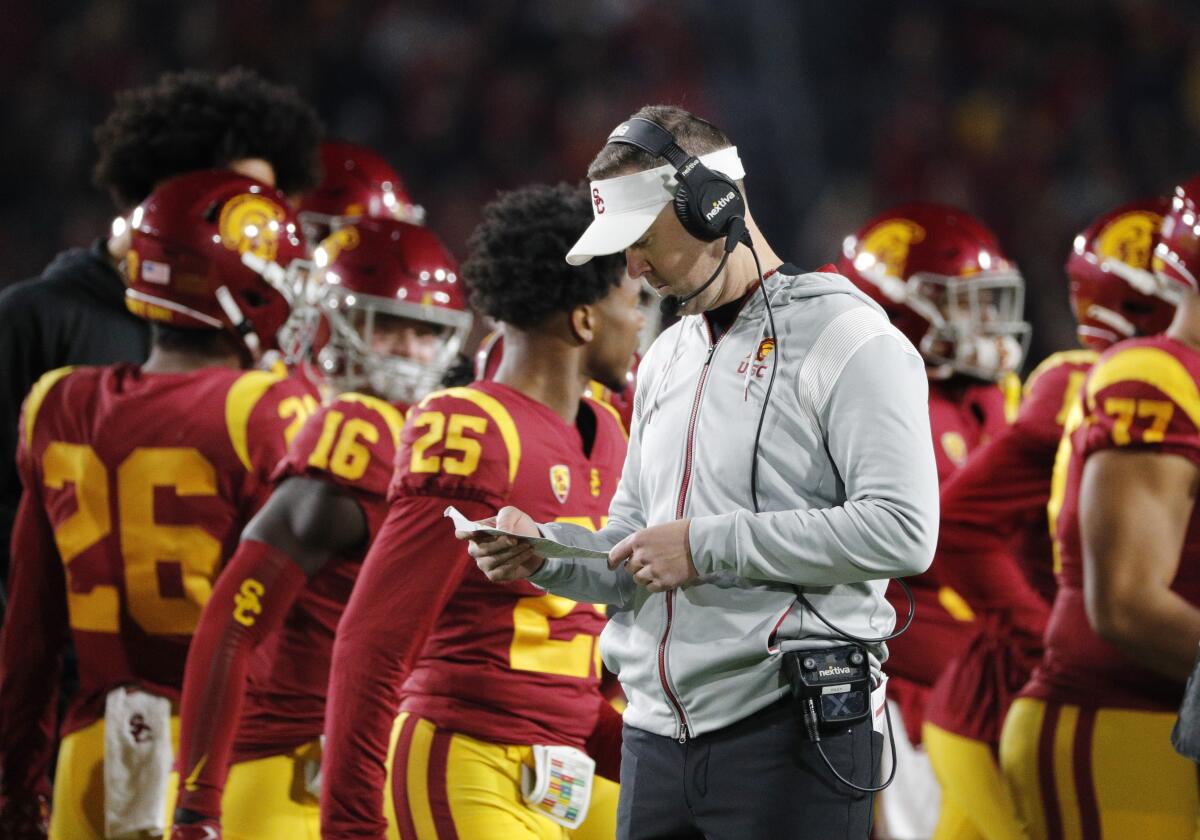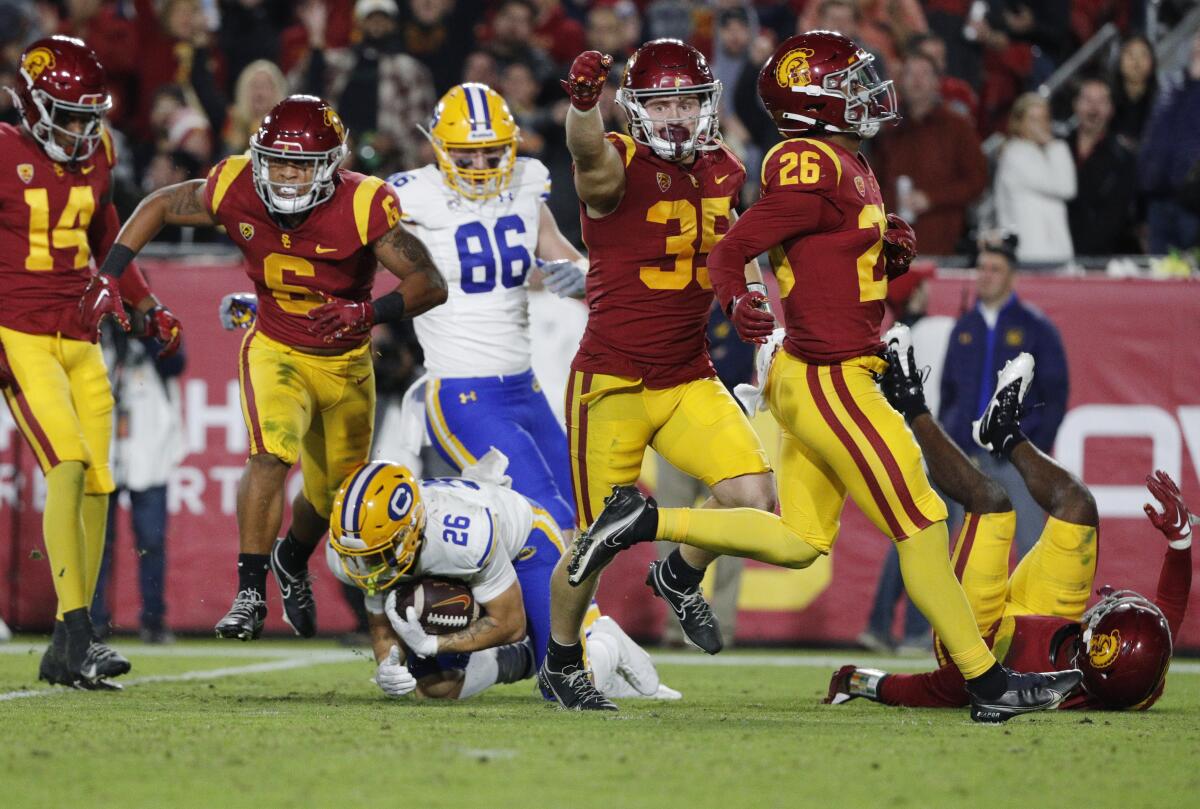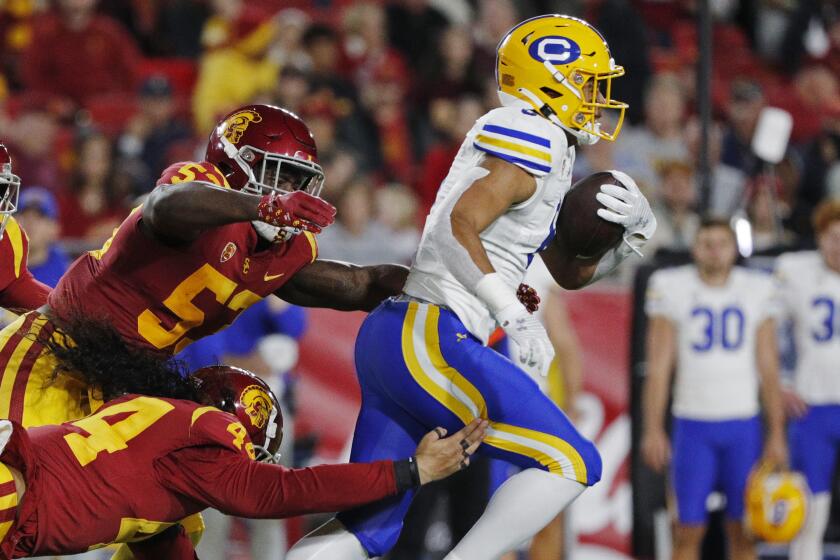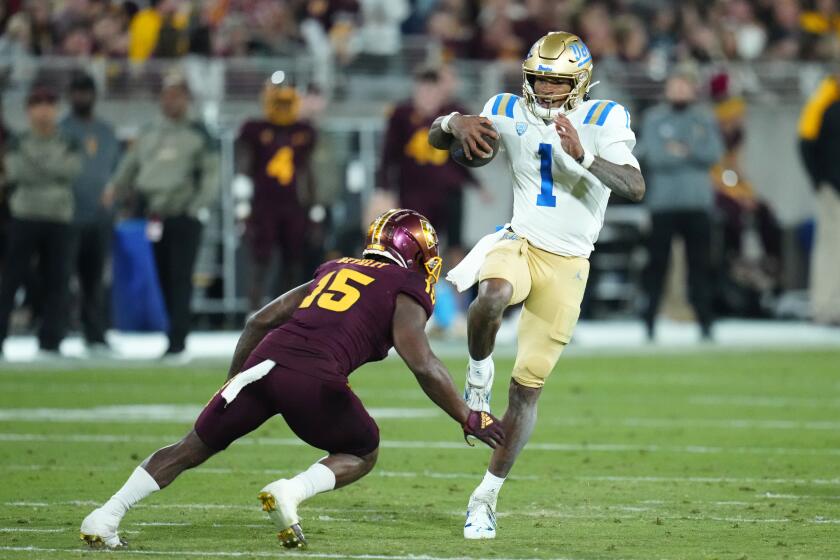Special teams coordinator? Lincoln Riley doesn’t believe in a dedicated one for USC

- Share via
It was already an eventful evening for USC’s special teams when, with 13 minutes remaining last Saturday against California, a surprise onside kick dribbled between receivers Brenden Rice and Kyron Hudson on the frontline of USC’s return team.
The Trojans had previously botched an extra point on a bad snap, and handed over prime field position due to poor punting. Now, the onside attempt bounced off Rice’s hand, slipped past Hudson and was recovered by the Bears. Cal scored soon after, cutting USC’s lead to seven.
It was a critical moment for USC’s special teams. But on the Trojans sideline, the man technically tasked with coordinating those special teams was limited in his ability to address it. That’s because NCAA rules bar Ryan Dougherty from doing any actual, on-field coaching.
A former East Carolina punter, Dougherty is listed as USC’s senior special teams analyst and assistant special teams coordinator. But in spite of the distinguished-sounding title, Dougherty is not considered among USC’s 10 on-field assistants. That means he can’t communicate with USC players on the field or during practice, but can help USC’s other coaches help players on special teams.
A strong performance by Caleb Williams helps No. 9 USC overcome another lackluster defensive effort in a 41-35 victory over California.
It’s a convoluted arrangement, born out of NCAA rules limiting football staffs to 10 full-time assistants. Hiring off-field analysts to get around those rules has since become a time-honored tradition across major college football.
But whether one of those precious full-time, on-field spots is best used on a coach coordinating special teams is still up for debate.
USC is one of just two Pac-12 teams that doesn’t entrust those duties to a full-time, on-field member of its coaching staff. (Cal is the other.) Three Pac-12 schools opened the season with one of their 10 full-time assistants dedicated solely to special teams, while USC’s opponent this week, Colorado, promoted a special teams assistant to the full-time staff midseason when Karl Dorrell was fired as coach.
The conference’s other six schools, including UCLA, have one assistant pull double duty, adding special teams to another positional responsibility, such as coaching tight ends or nickel backs.
For Lincoln Riley, there was never any question of how to split up those duties at USC. He chose instead to divide special teams units among select Trojan assistants, while Dougherty coordinated and oversaw the specialists.

“I don’t believe in a singular special teams coordinator. Not with the current limits on staff,” Riley said. “I’ve never believed in one coach that’s doing something for two periods of practice a day, then what’s he doing the rest of the time? Let’s have guys that are coaching guys all the time, everywhere.”
He’s not the only one who feels that way. UCLA coach Chip Kelly expressed a similar sentiment in 2018, suggesting special teams wasn’t the best use of a single assistant’s time.
“They’d have to take a vacation, get a lawn chair out there for them, have them sit down and not do anything,” Kelly said.
There was no sign of lawn chairs at USC practice the past two seasons, when Sean Snyder was on the Trojans staff solely to coordinate special teams. Nor did John Baxter, who served as USC’s special teams coordinator before Snyder, spend much time sipping piña coladas at Brian Kennedy Field during his eight seasons on staff.
But there’s also no evidence to suggest a full-time coordinator drastically improves a team’s chances at special teams success, either. In the Pac-12, Oregon State is one of four teams with a full-time special teams coordinator, yet the Beavers rank in the bottom three in the Pac-12 in nearly every metric measuring special teams performance.
USC hasn’t exactly been stellar at special teams this season. The return game has lagged. New punter Aadyn Sleep-Dalton has been inconsistent, averaging just over 40 yards per punt, while new kicker Denis Lynch is 5 for 5 on field goals at home, but has missed four of eight away from L.A.
The path still remains clear for both USC and UCLA for the College Football Playoff as the committee ranked them Nos. 8 and 12 this week.
Dougherty might not be allowed to coach USC’s specialists on the field, per se, but his influence has still been felt in those moments, Lynch said last month.
“If we ever miss, it’s like, we missed, what did we do, was it a bad snap, was it this?” Lynch said. “Coach Dougherty is big on, if you miss, don’t miss bad. Don’t miss the net. Make it a good ball and at least give it a chance to go in.”
Might those chances go up with a dedicated special teams coach? Well, that depends on who you ask.
More to Read
Go beyond the scoreboard
Get the latest on L.A.'s teams in the daily Sports Report newsletter.
You may occasionally receive promotional content from the Los Angeles Times.









